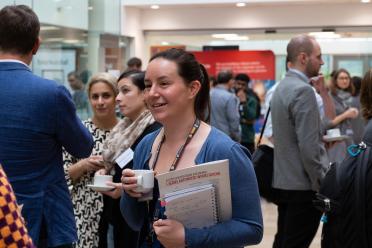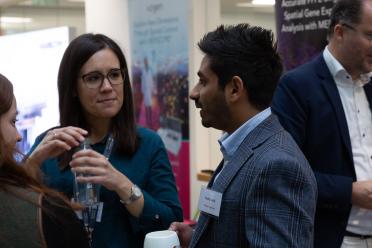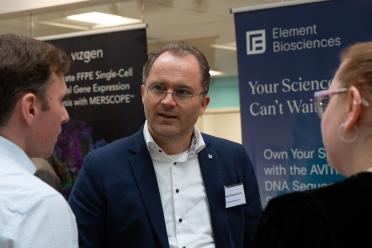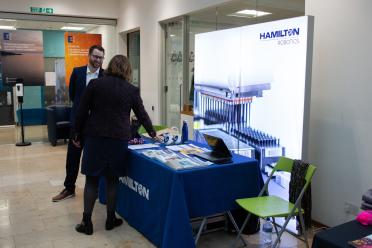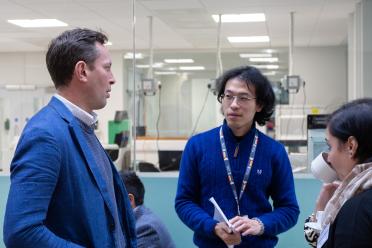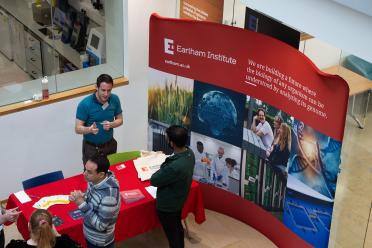Collaborating for our future
We can only survive the urgent threats facing humanity by working together to find innovative research solutions.
That was the clear message at EI Innovate.
This day-long event organised by the Earlham Institute is designed to give Institute researchers and our partners, as well as organisations exploring the possibilities of working with us, the chance to have a two-way conversation about research and innovation at the Institute.
The Earlham Institute’s Director, Professor Neil Hall, described EI Innovate to attendees as an event specifically designed to foster partnership and collaboration - both crucial to surviving the coming crises facing humanity.
“We’re all having to face the reality of climate change,” he said. “It’s vital we work together to form partnerships and find common ground with other organisations.”
The day offered a chance to discuss new technologies being developed, current advances and challenges in research and application, and some of the ways the Institute can form partnerships to help develop solutions to the problems facing the world.
Delegates from a range of disciplines, both academic and industrial, attended the event to learn about the research programmes and expertise at the Institute. They discovered the range of expertise, the state-of-the-art facilities available for collaboration, and training programmes to develop genomics and computational biology skills.

Everything you have heard is focused on aiming to achieve impact in the real world – improving clinical and diagnostic procedures in healthcare, improving access to food, and minimising the effects of climate change.

Dr Liliya Serazetdinova, Head of Business Development and Impact
They were given an introduction to the Institute’s new Strategic Programmes, launched earlier this year after the announcement of strategic funding by the Biotechnology and Biological Sciences Research Council (BBSRC), part of UKRI.
The Cellular Genomics strategic programme explores the rules of life, investigating the impact of diversity and variation in genes and expression at the single-cell level, helping us better understand fundamental biological processes and functions.
And the Decoding Biodiversity programme will address the need for tools, expertise, and capacity to mine genomic information from national and international genome sequencing initiatives, harnessing the Earth's biodiversity.
Both programmes are developing tools and approaches to harness genomic information and create new benefits for society and human welfare.
The Earlham Institute is also home to two National Bioscience Research Infrastructures (NBRIs), Transformative Genomics and the Earlham Biofoundry. These provide critical national infrastructure and expertise, and are accessible by external organisations and research groups.
Transformative Genomics translates the latest advances in genomics and bioinformatics into standardised genomics and bioinformatics workflows as well as giving the bioscience community access to expert advice. It provides scalable infrastructure, including tools and resources, training and collaboration, and specialist services for both internal and external collaborators.
And the Earlham Biofoundry offers expertise in synthetic biology approaches, large-scale experiment design, and automation programming, as well as full training in all these approaches. It provides a resource for the bioscience community to undertake large-scale projects, increasing accuracy and allowing miniaturisation to reduce costs.
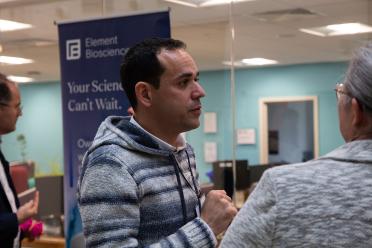
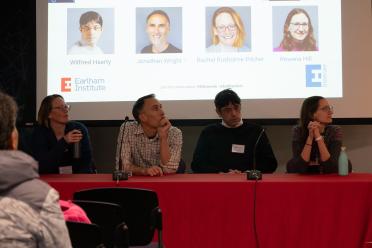
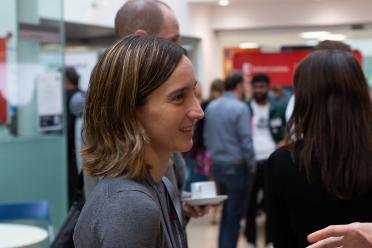
Pictured from left to right: Dr Karim Gharbi, Head of Genomics Pipelines and Lead for the National Bioscience Research Infrastructure in Transformative Genomics. Researchers from the Earlham Institute on a panel discussing the impact of high-quality genomes and pangenomes for plant and animal breeding. Dr Carolina Grandellis, Manager and Lead for the Earlham Biofoundry National Bioscience Research Infrastructure.
Individual researchers showcased some of the exciting cutting-edge research happening at the Earlham Institute.
One of the themes running throughout the day was the generation of high-quality genomes and pangenomes for plant and animal breeders.
Dr Wilfried Haerty spoke on reference genomes for tilapia, to improve yield, health, and resilience in aquaculture development, and Dr Jon Wright and Dr Rachel Rusholme-Pilcher discussed advancing wheat genomics through multiple genome assemblies to help wheat plants to adapt to a changing climate. Dr Rowena Hill described her work uncovering the genetic basis of fungicide resistance through pangenomics.
The Earlham Institute’s expertise in single-cell and spatial genomics was another focus. This included talks from Ashleigh Lister on pioneering work using single-cell approaches to improve the precision of plant breeding, Dr Sonia Fonseca on the single-cell and spatial transcriptomic analysis of the functions of the healthy bone marrow, and Yash Bancil on using single-cell techniques to investigate microbial species in complex microbiomes.
The third focus was impact from software and tools. It opened with a talk on building analysis workflows for improved genome annotation by Dr David Swarbreck, followed by Dr Simon Tyrell speaking on the necessity for standardising collection and description of data and metadata across the biosciences.
Dr Richard Leggett concluded with a discussion of how metagenomics can be used to solve academic and industry challenges. This session was followed by a panel discussion with the speakers and Pablo Moreno, Associate Director for Early Computational Oncology at AstraZeneca.
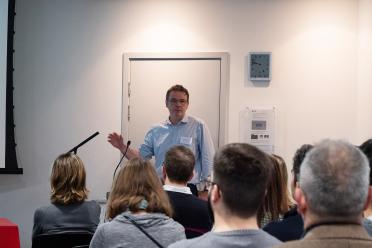
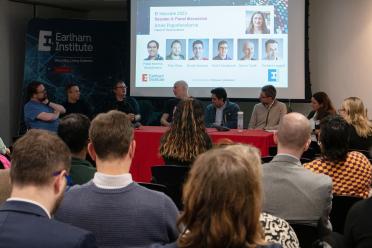
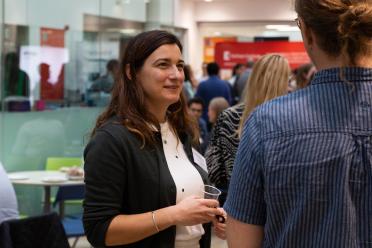
Pictured from left to right: Prof Anthony Hall, Head of Plant Genomics and Lead on the Decoding Biodiversity strategic programme. Researchers and Software Engineers from the Earlham Institute on a panel discussing the impact of bioinformatic software and tools. Dr Irene Papatheodorou, Gene Expression Team Leader at EMBL-EBI and incoming Head of Data Science at the Earlham Institute (2024).
Four of the Institute’s researchers, picked for their innovative collaborations, gave short presentations on the impact of their work in the last year.
Dr Josh Colmer spoke on the commercialisation of spin-out company TraitSeq and Dr Wilfried Haerty discussed investigating a new treatment for schizophrenia as part of the Psychiatry Consortium.
Dr Jose De Vega presented on becoming a research institute lead in the €5.9M Horizon-funded Legume Generation consortium, and Dr Thomas Brabbs spoke on working with leading automation company SPT LabTech, helping to design a new workflow, and contributing to new product development.
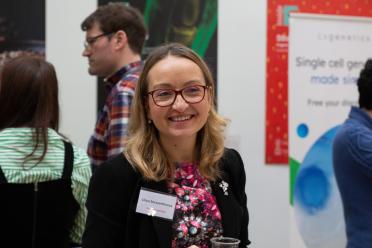
Head of Business Development and Impact Dr Liliya Serazetdinova closed the event.
“There has been a common thread in all the talks today,” she summarised. “ We have heard an incredible diversity of talks covering the breadth of Earlham’s research, from presenters in varied roles and at all stages of their careers.
“And everything you have heard is focused on aiming to achieve impact in the real world – improving clinical and diagnostic procedures in healthcare, improving access to food, and minimising the effects of climate change.
“We’re working on approaches and solutions that will help to reduce costs, speed up processes, discover new genes or bioactive molecules, and innovate. We are giving the communities we work with better and easier access to the data they need and helping them to automate, scale up their processes, and remove barriers.”
The Earlham Institute uses genomics and data-intensive bioscience to answer complex biological questions and address urgent global issues.
Our cutting-edge infrastructure and platforms, staffed by expert scientists and technicians, include the latest sequencing platforms and some of the most powerful High-Performance Computing systems installed in the UK.
We’ve worked with academic and publicly-funded organisations, government departments, NGOs, and private companies on projects that span crop breeding, precision farming, biotech, pharmaceuticals, and national security.
We have unique experience with model and non-model organisms and the generation of high-quality genomes from very small quantities of material, and our staff are experts in developing new technologies and upskilling and training the next generation of scientists.
Our Business Development and Impact Team can connect you with the appropriate experts and we welcome enquiries from any organisations interested in working with us.
Contact the team via business.development@earlham.ac.uk.
